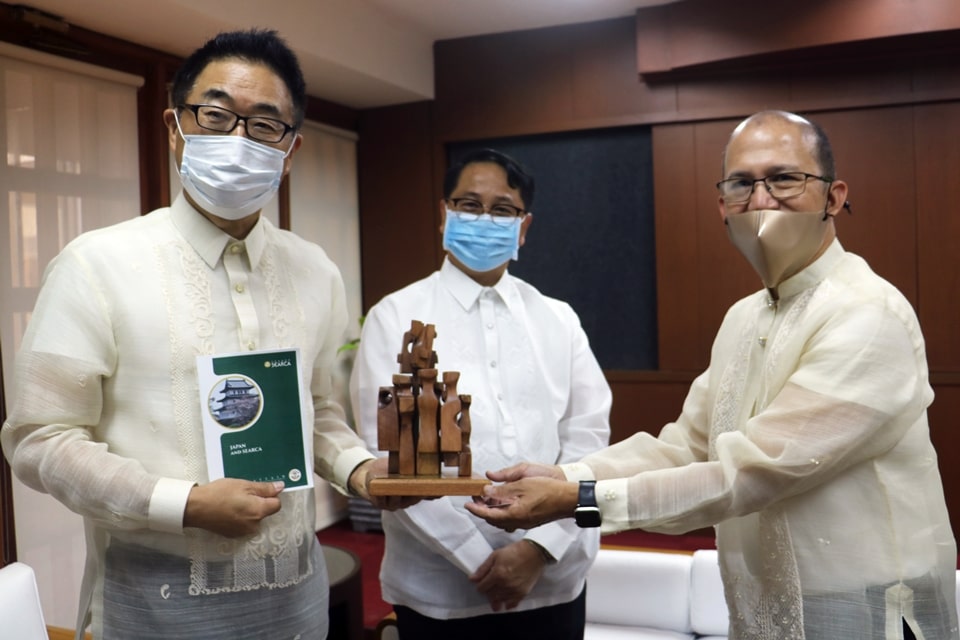 Japanese Ambassador Koshikawa Kasuhiko (left) holds a compendium on the collaborations between Japan and SEARCA since the 1970s and a mini replica of SEARCA’s Growth Monument presented to him Dr. Glenn B. Gregorio (right), SEARCA Director, while University of the Philippines (UP) President Danilo L. Concepcion looks on. The SEARCA Growth Monument consists of 11 stylized human figures linked internally on a square base, symbolizing synergy amid the diversity of the Southeast Asian Ministers of Education Organization (SEAMEO) member countries toward a more prosperous Southeast Asia.
Japanese Ambassador Koshikawa Kasuhiko (left) holds a compendium on the collaborations between Japan and SEARCA since the 1970s and a mini replica of SEARCA’s Growth Monument presented to him Dr. Glenn B. Gregorio (right), SEARCA Director, while University of the Philippines (UP) President Danilo L. Concepcion looks on. The SEARCA Growth Monument consists of 11 stylized human figures linked internally on a square base, symbolizing synergy amid the diversity of the Southeast Asian Ministers of Education Organization (SEAMEO) member countries toward a more prosperous Southeast Asia.
His Excellency Koshikawa Kazuhiko, the new Ambassador of Japan to the Philippines, visited the Southeast Asian Regional Center for Graduate Study and Research in Agriculture (SEARCA) on 6 March 2021.
He was received by Dr. Glenn B. Gregorio, SEARCA Director, and Mr. Joselito G. Florendo, SEARCA Deputy Director for Administration. With them were top officials of the University of the Philippines (UP) System and UP Los Baños (UPLB) as well as members of the National Academy of Science and Technology (NAST), Philippines who all gathered at SEARCA for the UPLB’s launch of the Jose Sotero Laurel III Professorial Chair in Agribusiness Management and Entrepreneurship.
During the Japanese envoy’s visit, Dr. Gregorio presented to him a compendium on the collaborations between Japan and SEARCA since the 1970s and a mini replica of SEARCA’s Growth Monument, which symbolizes synergy amid the diversity of the Southeast Asian countries.
SEARCA has a long history of cooperation with various Japanese institutions and organizations in graduate education and training as well as research. Most notable is the SEARCA-implemented Integrated Jalajala Rural Development Project jointly funded by Japan International Cooperation Agency (JICA) and the Philippine government to develop a model agrarian community for the beneficiaries of the Comprehensive Agrarian Reform Program in Jalajala, Rizal, Philippines. JICA funded a rice processing complex whose operations were turned over to SEARCA by then President Fidel V. Ramos. SEARCA managed the facility for a two-year transitional period as it instituted a program for the project beneficiaries to increase rice production and established a scheme for the federation of Jalajala-based cooperatives to take over the rice mill operations.
Last year, SEARCA completed a project on upgrading the calamansi value chain towards improving the calamansi industry of Oriental Mindoro, Philippines with Tokyo University of Agriculture (Tokyo NODAI) as one of the implementing partners.
According to Dr. Pedcris M. Orencio, Tokyo NODAI carried out a study on improving off-season fruit production through pruning, using plant regulators such as ABA to enhance the plant development process, and S-ABA to increase flowering.
He added that Tokyo NODAI shared with the project the results of their studies on quality evaluation of calamansi fruit produced through a physico-chemical assessment process.
Currently, the Japan-supported Economic Research Institute for ASEAN and East Asia (ERIA) is working with SEARCA and the ASEAN Secretariat in developing the ASEAN guidelines for use of digital technology. Dr. Orencio said this undertaking is one of the three components of the project titled “Enhancing Food Supply Chain Resilience and Food Security in ASEAN with Utilization of Digital Technologies” funded by ERIA.
SEARCA conducted the 1st Knowledge Sharing Workshop for the project on 22 February 2021. The online workshop aimed to discuss and level-off on the applications, trends, and development of digital technologies in the agricultural sector with the ASEAN Member States (AMS), and to gather their inputs and suggestions for developing the ASEAN Guidelines for Accelerating Transformation of Food and Agriculture through Digital Technologies and Innovation.
Meanwhile, there are two ongoing scholars under the Tokyo NODAI-SEARCA Scholarship for Dissertation Doctorate Program. Five Southeast Asians received this scholarship, three of whom had completed their doctorate program.
Tokyo NODAI is an associate member of the SEARCA-initiated Southeast Asian University Consortium for Graduate Education in Agriculture and Natural Resources (UC), having joined the UC in November 2006. Launched by SEARCA in 1989, the UC is a network that links strong universities in Southeast Asia, Canada, Germany, Japan, and Taiwan. In 2010, Tokyo NODAI initiated the Tokyo NODAI-UC Scholarship for Dissertation Doctorate Program, which is open to qualified faculty and staff of UC members.
On the other hand, there is one ongoing and two completed Filipino scholars under the Nagoya University (NU)-SEARCA Joint PhD Research Scholarship in Agriculture at the NU Satellite Campus based at the UPLB Graduate School. Through the joint scholarship, four Cambodians also earned their PhD at the NU Satellite Campus for Bio-agricultural Sciences based at the Royal University of Agriculture (RUA) in Phnom Penh, Cambodia.
The degree program is a PhD by Research combined with lectures, seminars, and student advising with Japanese Professors. Upon completion of degree requirements, NU confers the degree of Doctor of Agriculture or Doctor of International Development to the NU-SEARCA scholars.